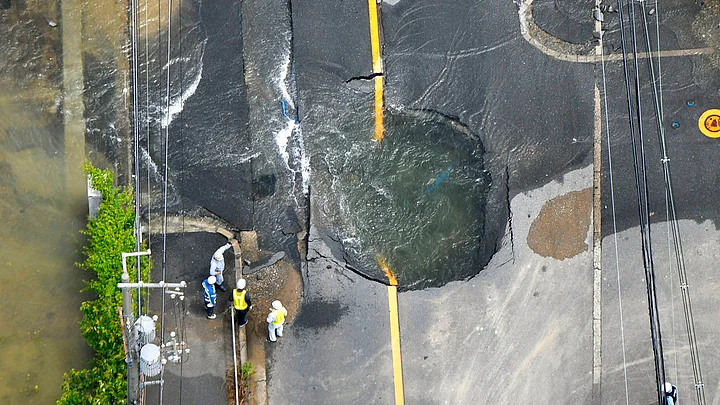A magnitude 6.1 earthquake shook Osaka, Japan's second-biggest metropolis, early on Monday morning, killing three people, halting factory lines in a key industrial area and bursting water mains, government officials and broadcaster NHK said.
No tsunami warning was issued. Prime Minister Shinzo Abe said authorities were assessing damage and that its top priority was the safety of residents.
Japanese media including public broadcaster NHK said collapsing walls had killed an 80-year-old man and a 9-year-old girl, and that another man in his 80s was killed after being crushed by a toppling bookcase.
Live footage showed burst water mains and a house on fire after the quake hit Japan's second-biggest metropolis just before 8 am (2300 GMT Sunday) as commuters were heading to work.
Prime Minister Shinzo Abe said the government was assessing damage and that its top priority was the safety of residents.
The epicentre of the earthquake was just north of Osaka city, said the Japan Meteorological Agency, which originally put the magnitude at 5.9 but later raised it to 6.1.
The quake struck an important industrial area of central Japan. Osaka-based Panasonic said it was halting production at two of its plants – one that produces lighting devices and another for projectors.
Daihatsu Motor Co, an Osaka-based unit of Toyota Motor Corp , said it had suspended production at its factories in Osaka and Kyoto while they check for damage.
Japanese media including public broadcaster NHK said collapsing walls had killed an 80-year-old man and a 9-year-old girl, and that another man in his 80s was killed after being crushed by a toppling bookcase.
The government confirmed two of the deaths.
"We were sleeping and it woke us up abruptly," said Kate Kilpatrick, 19, who was staying in a hotel in Osaka when the quake hit.
"It was so terrifying because this is my first earthquake. I thought it was a nightmare because I was so confused. The whole world was aggressively shaking," she said.
Kilpatrick, visiting Japan for the first time from the United States, said alarms went off almost immediately in the hotel and a loudspeaker told guests to stay away from windows.
Osaka prefecture, which includes the city and surrounding areas, has a population of 8.8 million.
No irregularities were detected at the Mihama, Takahama and Ohi nuclear plants to the north of Osaka, Kansai Electric Power said. More than 170,000 households in Osaka and neighbouring Hyogo prefecture lost power temporarily but it was restored within two hours, the utility said.
Kansai Electric Power said no irregularities had been detected at the Mihama, Takahama and Ohi nuclear plants after the quake. Kansai also said more than 1,70,000 households were without power in Osaka and neighbouring Hyogo prefecture.
Sharp Corp said its directly owned plants in the area were operating as usual, but a joint venture plant with parent Hon Hai Precision Industry said it had halted operations for safety checks.
Honda Motor Co. said production in Suzuka, in nearby Mie prefecture, was halted for checks but no problems were found and operations were back to normal.
A massive magnitude 9.0 quake hit northeastern Japan on 11 March, 2011, triggering a huge tsunami that killed some 18,000 people and triggered the world's worst nuclear disaster in a quarter of a century at Tokyo Electric Power's Fukushima Daiichi nuclear plant.
(At The Quint, we question everything. Play an active role in shaping our journalism by becoming a member today.)
